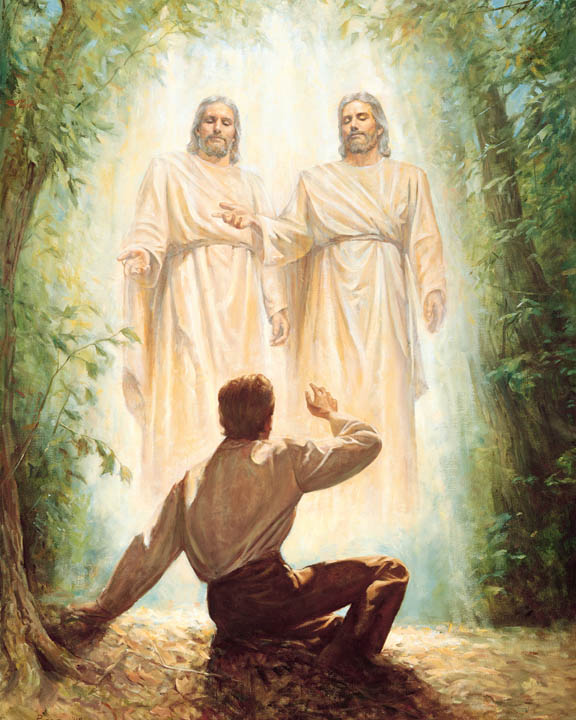Whenever we discuss the life of Joseph Smith—the first prophet of the Church of Jesus Christ of Latter-day Saints, also known as the Mormon church, we usually start with the First Vision. We begin with a brief retelling of the religious tumult, then focus on the following events. We stand beside him as he thoughtfully walks into the grove, and with determination offers up his first vocal prayer. We then talk about the magnificent thing that happened in answer to that prayer.
 This is all correct. However, sometimes we do not savor the event as it unfolds. We in the 21st Century already know what happened when that special fourteen-year old boy finished praying. We know that the Father and the Son personally appeared to him, called him by name, said his sins were forgiven him, and answered his question about which church to join.
This is all correct. However, sometimes we do not savor the event as it unfolds. We in the 21st Century already know what happened when that special fourteen-year old boy finished praying. We know that the Father and the Son personally appeared to him, called him by name, said his sins were forgiven him, and answered his question about which church to join.
But we sometimes gloss over the personal anxiety Joseph Smith felt before he stepped into what we now call the Sacred Grove.
In his early 1832 History, Joseph Smith explained:
“My mind became seriously impressed with regard to the all important concerns for the welfare of my immortal soul, which led me to searching the scriptures, believing, as I was taught, that they contained the word of God. Thus applying myself to them and my intimate acquaintance with those of different denominations led me to marvel exceedingly, for I discovered that they did not adorn their profession by a holy walk and godly conversation agreeable to what I found contained in that sacred depository. This was a grief to my soul. …”
“I pondered many things in my heart concerning the situation of the world of mankind—the contentions and divisions, the wickedness and abominations, and the darkness which pervaded the minds of mankind. My mind became exceedingly distressed, for I became convicted of my sins, and by searching the scriptures I found that mankind did not come unto the Lord, but that they had apostatized from the true and living faith, and there was no society or denomination that built upon the gospel of Jesus Christ as recorded in the New Testament, and I felt to mourn for my own sins and for the sins of the world.” (“Chapter 1: The First Vision: The Father and the Son Appear to Joseph Smith,” Teachings of Presidents of the Church: Joseph Smith, (2007),26–35)
In this day and age we talk about teenage angst. This is exactly what young Joseph Smith felt. He was raised in a Christian family, studied the Bible regularly, and tried to live as righteously as possible. Yet he still had that nagging feeling in the back of his mind that something was missing. This feeling is a common one.
Even though I was born into the Church, I grew up in California. From kindergarten to my senior year of high school, not one of my teachers was a member. I did have friends from church, and we did the usual church related activities. But I also had friends of other denominations—Roman Catholic, Baptist, Lutheran, Episcopalian, Jewish and “unchurched.”
As we went about doing our normal boy activities (modern versions of Huck Finn and Tom Sawyer,) I was exposed to their faiths. In school I was also exposed to different ideas and philosophic systems. For a teenager who was exploring things, and starting to see the world with adult eyes, I felt the same way, in some respects, that Joseph Smith may have felt in 1820.
What set Joseph Smith apart from the masses was rather than wallowing in angst or going along with the crowd (in one retelling of the First Vision he said that he wanted “to feel and shout like the rest but could feel nothing”), he took his question to the Bible, and in turn, was directed to God Himself through the process of prayer.
(John 1:1)

